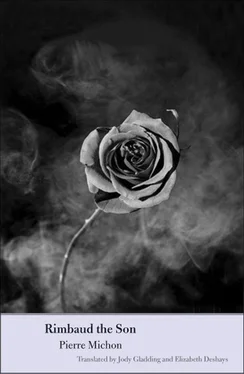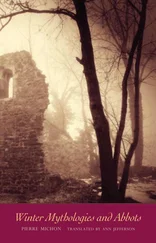Everyone knows that precise moment in October. Maybe it is the truth, in a soul and in a body; we see only the body. Everyone knows the disheveled hair, the possibly blue-white eyes, light as the day, that do not look at us but gaze over our left shoulder where Rimbaud sees a potted plant that is climbing toward October and burns up carbon, but for us, that gaze looks toward the future vigor, the future abdication, the future Passion, the Saison and Harar, the saw over the leg in Marseille; and for him no doubt as for us, that gaze is also on poetry, that conventional specter conventionally verified in the disheveled hair, the angelic oval face, the aura of sulkiness, but beyond all conventionality there also behind our left shoulder and gone when we turn around. We see only the body. And in the lines, can we see the soul? In all that light, the wind passes. In the passageway the miters lack luster and witness. The hands of the second fiddles hang. They are quiet. They do not know for certain that the set lips have spoken Le Bateau ivre , but they suspect that they have spoken some lines: they have had their photographs taken as well, on the stool they have recited to death their second fiddle masterpieces. They do not know any better than we do on which stanza Carjat took his shot, which word he trapped; no, we do not know if at that moment Rimbaud longed for Europe . We cannot see the laundress’s hands. We cannot see the color of the eternally crooked tie.
Carjat makes other plates, which are unknown — he destroyed them later when the two of them came to blows. He does not know that he has just made his masterpiece. The sons are sitting on the ground and making jokes, Rimbaud has become withdrawn again, these poets horsing around like naughty choirboys bore him stiff. Suddenly we can hardly see them. They are not going to stay there all afternoon. That is it. Carjat goes by with his plates, there are the vats, the nitrates, no time to waste, the sons know the way. They take their top hats, the hat peg is bare and alone in the hallway. The sky lowers over the five sons; they are in the street, the October light is declining, the trees are moving, the golden leaves are flying in the simple rhythm of the wind. They are gems underfoot. Holding onto their hats, the flashes of black descend the slope full tilt. They cross Paris, seven times a star appears in the Big Dipper, they are in the Académie d’absinthe.
7. IT IS ALSO SAID THAT GERMAIN NOUVEAU, POET
It is also said that Germain Nouveau, poet; that Alfred Mérat, Raoul Ponchon, Stéphane Mallarmé, poets; that Émile Cabaner, musician; that Henri Fantin-Latour, painter; that Jacques Poot, Brabant printer; that beyond Suez, Pierre and Alfred Bardey, merchants; that César Tain, merchant; that Sotiro, lowly employee of the merchants; that Paul Soleillet and Jules Borelli, explorers; that Menelik, king; that Makonnen, ras , that is to say grand duke; that little Djami, gentle young minion; that His Grace Jarosseau, bishop in partibus; that six nameless black Abyssinians running toward the sea with a stretcher on their backs; that on this side of Suez the doctors Nicolas and Pluyette who officiated double quick with a saw in the Marseille hospital; that the priest Chaulier who, after the saw had done its work, offered the unleavened bread in that same hospital; that Isabelle, Rimbaud’s sister, to whom in the depths of mortal agony he may have called for God, or perhaps for gold or minions, we will never know; that the two or three white gravediggers in Charleville, as nameless as the six Abyssinians; that many witnesses, finally, saw with their own eyes that mythology, when it was that tall young man who was becoming old and dying. That tall young man of the great blunted rages, who no longer had Virgil on his desk to foster his rages, nor Racine, Hugo, Baudelaire, nor little Banville; who, for that matter, no longer even had a desk; who instead had a workbench strewn with do-it-yourself guides, surrounded by those black and white men I have mentioned. And as such, all those with whom he was associated, like Izambard, like Banville and Verlaine, that is to say, who served as father or brother and who thus passed on the phantom bugle, all those men deserve a chapter here.
I will not write those chapters.
I will abandon those men.
You, young man of Douai or of Confolens, you have seen those men; you know them better than I do: getting off your motorbike in front of the library, removing your Walkman, entering the cool vaulted archways and proudly planting yourself in the arid hall where the referents sleep, you have asked the orderly on duty in the gray smock, the assis , for the little canonical iconography; looking down on him scornfully, rearranging your little lock of hair over your brow, and then perhaps feeling across your shoulders the motorcycle jacket ripping from the pressure of wings, you have asked not for the works of Banville, Nouveau, and Verlaine, but: the Pléiade edition of Rimbaud. Because you thought, reasonably enough, that you would find there, in the simple portraits of men who lived, the meaning that in the Illuminations whirls round and then disappears.
You have seen these men; you have interrogated their portraits in the little canonical iconography; and sheet after sheet those gazes that rested on poetry in person have leapt from the page toward you. Page after page under those impenetrable stares you have asked yourself what a witness is. You have meditated upon the vanity of the portraits assembled there, and nonetheless devotedly you have interrogated them. And those who do not appear on the page, the Abyssinian porters, the Abyssinian minion, the Brabant printer, you have seen in your mind’s eye sharing some object with Arthur Rimbaud. Leaning over your shoulder in the Confolens library, I have looked at them through your eyes: if they were printers, I have seen them make the Saison into the small magic folio that is more satisfying than bread, and more disappointing; if they were poets, I have seen them in my mind copying out whichever Illumination had just been written, not being satisfied with it, and recopying that small whirlwind into which all language flees with the meaning that disappears, I have seen them gaping as Vitalie Cuif gaped in Charleville before the Virgilian spreads: in London we have seen Germain Nouveau look up in the middle of an Illumination , displaying the proud profile, the poet’s beard, the melancholy gaze turned toward the meaning that disappears. If they were merchants, I have seen them with Rinbo the merchant laying out antelope hides full of meaning; if they were kings or grand dukes, I have seen them bargaining with him over cases of rifles, lead heavy with meaning. If they were painters, you have seen their hands produce the painting called Le Coin de table; you have seen them bringing off that fabulous group portrait in which all of them, the six poets who fell into the abyss, Bonnier, Blémont, Aicard, Valade, d’Hervilly, Pelletan, and the two poets who shine among the stars, Verlaine and Rimbaud, are seated on the same chairs, breathe the same air, have drunk the same wine, have the same gaze variously cast there toward the blue line of posthumous glory; right below the handsome Elzéar Bonnier under his black miter, mitered by his hair only as in 1830, you have seen Rimbaud to whom in the end the miter returned, the nimbus of History; and this enigmatic Last Supper in which, unusual for such a painting, the Son among the sons is not in the center of the sons, opening his hands toward the sons, but toward one side and even turning his back a bit on the others, this Last Supper of modern times has filled you with wonder and a little anxiety. Thus if they were painters they felt that and showed it, by chance perhaps, but, one would like to think, miraculously. And if they practiced the obscure art of nitrates moved by light under the black hood, I have seen them a hundred times, and I want to see them one more time make that portrait I mentioned, that mandorla better known now in this world than the veil of Saint Veronica, more full of sense, more empty, that most high icon in which the tie is eternally crooked, the tie whose color remains eternally unknown. I have seen Carjat, and perhaps we have all seen him, pensive, gazing at that crooked tie, hesitating to straighten it before taking the photo. We have seen Carjat at that vertiginous moment when he tossed onto the scale the oval portrait that weighs as much as his entire work, or just about. And Sotiro too, the little Greek employee who practiced the art of the nitrates very incidentally when his boss Rimbaud had told him before striking his pose how the black hood was to be put on, through which hole to look, which bulb to squeeze, which blade to release, little Sotiro who resembled Tartarin and conversed with language in person in a very relative French, we have seen him in the banana fields fixing once and for all, standing and too far away, the incalculable figure of Rimbaud the boss; and beyond Sotiro bustling about the hooded camera brought at great cost from Lyon, lugged for so little across the deserts, we have seen the old Rimbaud gazing into the eyes of an old woman in Charleville for whom he intended the photo. These men saw him; these men conversed with Rimbaud; and whether between them it was a question of meters or rifles, I have seen them all go speechless, laugh unpleasantly, and then justify themselves, or pound the table harder — if they were kings or grand dukes, that is — when Rimbaud’s fist hit the table. But I will not speak of them any longer.
Читать дальше












